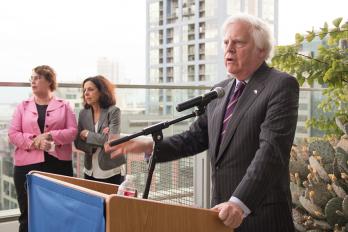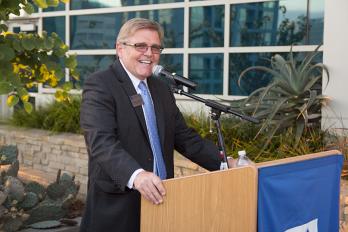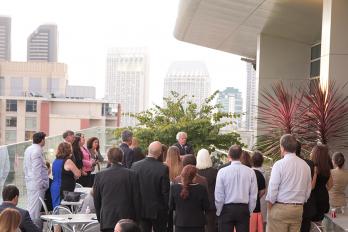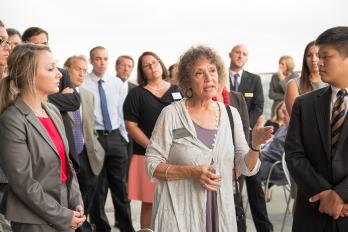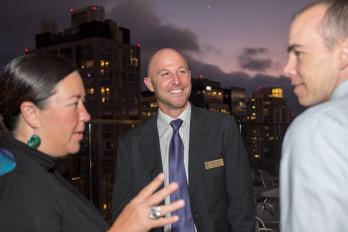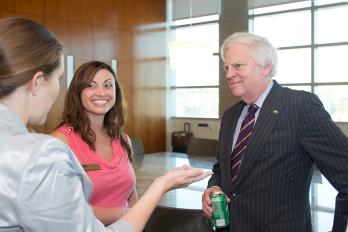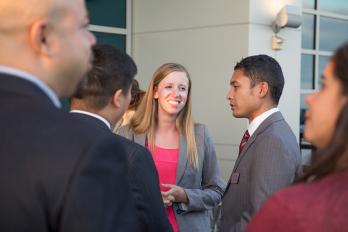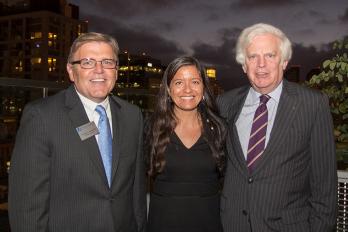TJSL Welcomes ABA President
September 24, 2013
Immigration, lack of access to attorneys in rural areas, boosting student diversity in legal education and incubator programs are among the topics American Bar Association President James R. Silkenat addressed during his visit to Thomas Jefferson School of Law on Tuesday, September 17. Invited students, alumni, faculty, staff and other guests at the private evening reception on the 8th floor terrace had a rare personal opportunity to ask the newly elected president a variety of questions about issues of concern to the legal community.
Silkenat, who also is a partner in the New York office of the national firm of Sullivan & Worcester, was in San Diego to promote his immigration initiatives. He toured the Otay Mesa Detention Facility and the Port of Entry with members of the ABA Commission on Immigration, starting the day at a Legal Orientation Program presented by the ABA’s Immigration Justice Project (IJP).
Following brief welcoming comments at the reception, TJSL Dean and President Thomas Guernsey turned the podium over to TJSL alumna Elizabeth M. Knowles ’12, who is the Director of the IJP in San Diego and was instrumental in helping to organize the reception that was co-hosted by the ABA Commission on Immigration (COI). Other guests present included COI Chairperson Christina Fiflis, Special Advisor to COI Karen Grisez, ABA Section of Litigation Chair Don Bivens, ABA Board of Governors Member Mark Schickman and District Attorney for the Twentieth Judicial District for the State of Colorado, Stan Garnett.
“We are thrilled that President Silkenat has come to visit the Immigration Justice Project this early in his term!” said Knowles. “This visit allowed him to see the ABA IJP’s work up-close, and to familiarize himself with many sides of the immigration situation along our international border. It is very meaningful to our organization that President Silkenat has made a point of highlighting immigration as an area of focus during his presidency.
“I am extremely pleased that so many were present at the reception to welcome President Silkenat and the other ABA leaders to San Diego. I enjoyed the President’s ‘town hall’ approach to engaging the audience and the easy exchange of dialogue among the crowd. I especially appreciated ABA Board of Governors Member Mark Schickman’s remarks encouraging everyone to support the work of the IJP and to attend our celebration in October.”
According to Silkenat, immigration issues are high on the ABA’s priority list and he referred to his activities earlier in the day as a “really exciting educational exercise” and “a moving experience” to see the individuals involved in the immigration process at work.
He also expressed concern about the sequestration problem. “If courts don’t have funding to operate, they have to lay off translators,” said Silkenat. “The first message I sent was to urge all 400,000 of you (attorneys) to contact your congressmen to end sequestration because it is wreaking havoc on all our courts… Our constitution requires a different result. Courts are an independent branch of government and they can’t be treated the way they are being treated by Congress.”
Providing access to legal counsel in rural areas of the U.S. is another issue he addressed. “Technology isn’t going to solve all the problems – you need to have access to an individual and live lawyer,” he emphasized. “You shouldn’t have to drive 200 miles to have a will prepared.”
Silkenat also applauded the lawyer incubator programs that some law schools, including TJSL, have established to provide legal services to citizens with unmet representation needs. “It (incubator programs) absolutely has to be part of the program and we intend to steal all of your good ideas!” he said.
Many of those in attendance at the reception expressed positive reaction to the comments made by Silkenat, including the following members of the TJSL Community.
Samantha Morales (3L), Intern for the ABA Immigration Justice Project: “I was pleased to hear President Silkenat personally visited our border and the Otay Mesa Detention facility I visit each week. He acknowledged that many people have uneducated views on immigration issues, which I believe will only be resolved with open dialogue from leaders who truly understand the implications behind our current immigration laws. When leaders like Silkenat take the time to educate themselves on controversial issues, they move us in the right direction.”
“Detained immigrants do not have a right to court appointed counsel, are housed in prison-like settings and face dramatic consequences that can permanently separate them from their families or force them to return to a country where they fear persecution. Most represent themselves, navigating through complicated court proceedings despite having significant language, literacy and cultural barriers. As an intern for the ABA Immigration Justice Project, I am part of a unique and crucial program that aims to uphold due process and access to justice.”
Milena Celentano (3L), Student Bar Association President: “I’m so grateful I had the opportunity to attend the reception and meet President Silkenat. It was incredibly informative to learn the ABA’s stance on today’s most pressing issues, especially those relating to law students.”
Marjorie Cohn, TJSL Professor of Law: “It was an honor to host ABA President Silkenat at Thomas Jefferson School of Law. His commitment to human rights and eagerness to engage with the attendees on the hot button issues such as immigrant’s rights, access to legal services and changes in legal education was refreshing.”
David Gibbs ‘12, TJSL Alumni Association Board Member: “The most memorable aspect of the evening was the town hall style question and answer period in which President Silkenat took questions on a broad range of topics from the audience. I found him to be open to discuss any topic and direct in his responses. The final question was asked by Professor Judy Beth Tropp. Professor Tropp asked President Silkenat what his top two priorities are for his term as the ABA President. I was impressed to hear that President Silkenat’s top priority is to end the disastrous effects that sequestration have taken on our courts. Court budget cuts have disproportionately affected the poor, and those who typically have a difficult time accessing our justice system. I support President Silkenat in his efforts to end sequestration and restore funding to our courts.”
“Another memorable aspect of the evening for me was seeing my friend and colleague, Elizabeth Knowles ‘12, excel in her position as Director of the Immigration Justice Project. I am proud beyond words for Elizabeth and I know that she has a bright and rewarding career ahead of her. She is doing a great job and is demonstrating the caliber attorney Thomas Jefferson School of Law produces. Kudos to Elizabeth.”
“It was great to be a part of an event that highlighted our school and one of our graduates. The event was yet another example of why I am so proud to be a Thomas Jefferson graduate and so proud to be associated with such a great institution.”
